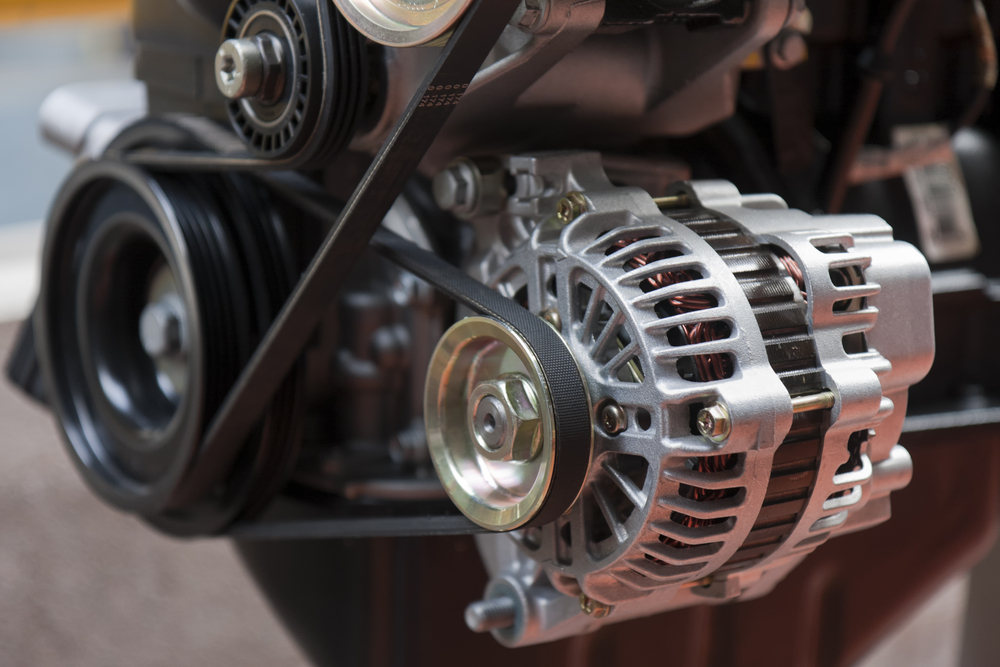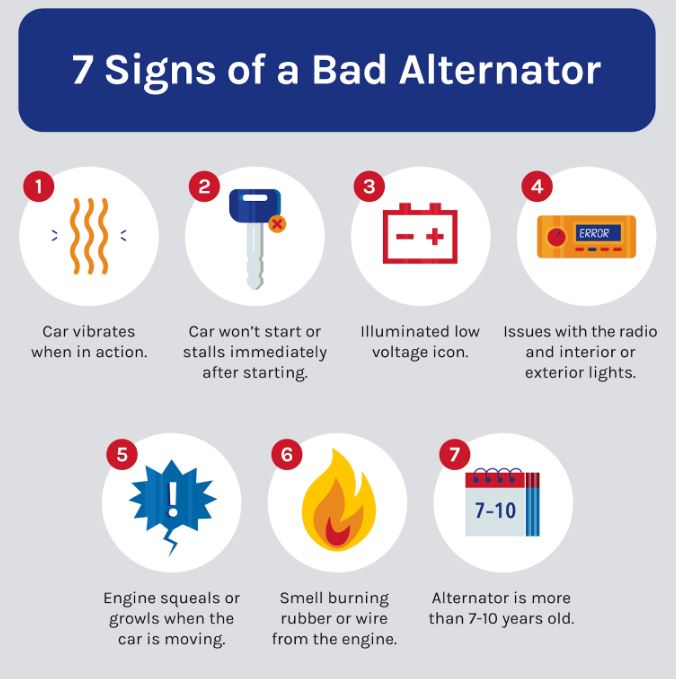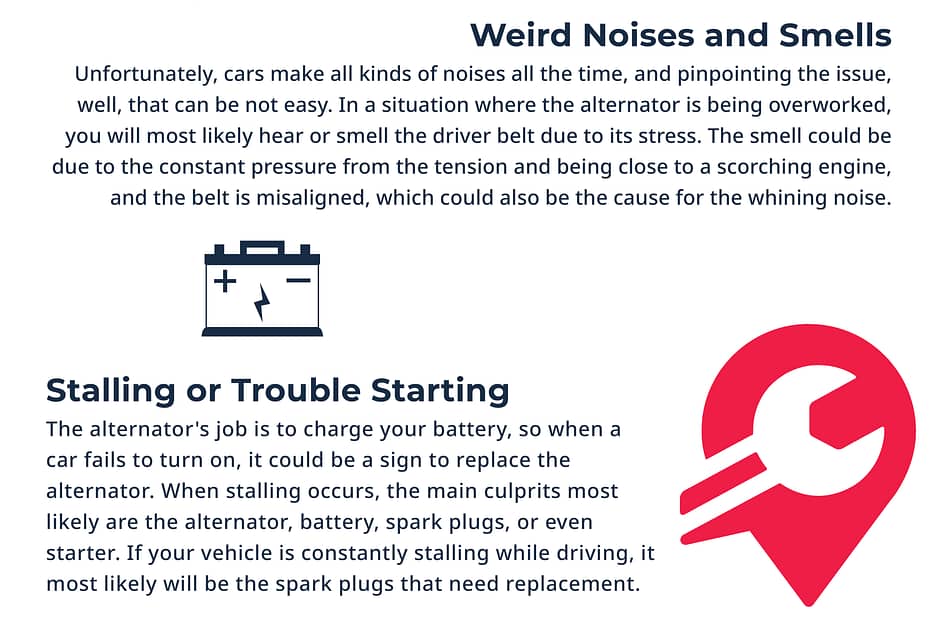If your car is having trouble starting, dimming headlights, or dashboard warning lights are on, you may need a new alternator. It’s essential to pay attention to these signs and get your vehicle inspected by a professional to determine if a new alternator is required.
Your car’s alternator plays a critical role in keeping the battery charged and powering various electrical components. When it starts to fail, it can lead to a range of issues that affect your vehicle’s performance. From dimming lights to strange noises, there are several signs that indicate a potential problem with your alternator.
It’s crucial to recognize these signs and take action promptly to avoid being stranded on the road due to alternator failure. We will discuss the common signs that indicate you may need a new alternator and what steps you should take if you experience these symptoms.

Credit: www.cadillacatservice.com
Signs Of A Failing Alternator
If you’ve ever experienced issues with your car’s electrical system, it could be a sign of a failing alternator. The alternator plays a crucial role in charging the battery and powering the electrical components of your car. When it starts to fail, it can cause a variety of problems that can leave you stranded on the side of the road.
Dimming Headlights
One of the most common signs of a failing alternator is dimming headlights. If you notice that your headlights are flickering or becoming dimmer than usual, it’s a red flag that your alternator may be on the verge of giving up. The alternator is responsible for providing power to the headlights, so when it fails, the lights may start to dim or lose their brightness.
Strange Noises
Strange noises coming from under the hood of your car can also indicate a failing alternator. These noises can vary, but common sounds include grinding, whining, or squealing. If you start hearing any of these unusual sounds while driving, it’s crucial to have your alternator inspected as soon as possible. Ignoring the noises can lead to further damage and potential breakdowns.
Testing The Alternator
When it comes to diagnosing car problems, one of the key components that often needs attention is the alternator. If you suspect issues with your vehicle’s electrical system, it’s important to check whether the alternator is functioning properly. Testing the alternator can help you determine if it needs to be replaced. There are a few methods to assess the condition of your alternator, each varying in complexity and accuracy.
Using A Multimeter
One way to test an alternator is by using a multimeter. This device measures electrical current, voltage, and resistance in a circuit. First, ensure the vehicle is off and disconnect the negative battery terminal. Set the multimeter to the voltage setting and attach the positive and negative leads to the corresponding battery terminals. Start the engine and observe the reading. A healthy alternator should produce around 13.8 to 14.2 volts when the car is running. If the reading falls below or exceeds this range, it may indicate alternator issues.
Inspection By A Mechanic
If you’re not comfortable using a multimeter or need a more thorough assessment, it’s wise to have your alternator inspected by a certified mechanic. They will conduct a comprehensive examination of the alternator and its components to determine if any faults or malfunctions are present. The mechanic may also check for loose connections, worn-out belts, or abnormal noises that could indicate a failing alternator. A professional diagnosis can provide a more accurate evaluation and help you decide on the necessary course of action.
Factors To Consider
If your vehicle experiences dimming headlights, strange noises, or difficulty starting, it could indicate a failing alternator. Pay attention to warning signs like dashboard warning lights or battery issues as indications for potential alternator replacement. Regular maintenance can help prevent unexpected breakdowns.
Age Of The Alternator
The age of the alternator is a crucial factor in determining whether it needs replacement. As a general rule, alternators have a lifespan of about 7-10 years. If your alternator is approaching or surpassing this age, it’s prudent to consider the possibility of replacement.
Battery Life
The battery life is closely intertwined with the functionality of the alternator. A weak or failing battery can put excessive strain on the alternator. If you’ve recently replaced your battery and you’re still experiencing electrical issues, such as dimming headlights or a sluggish start, it may be indicative of an alternator problem.

Credit: www.gmpartscenter.net
Cost Of Replacing An Alternator
When your car starts showing signs of electrical troubles, it’s important to consider whether a faulty alternator might be the culprit. The alternator plays a crucial role in keeping your vehicle’s electrical system charged and functioning properly. However, like any other car component, alternators can wear out over time. If you’re wondering whether you need a new alternator, it’s essential to understand the cost involved. Let’s delve into the labor costs and alternator prices to give you a clearer picture.
Labor Costs
When it comes to replacing an alternator, the labor costs can vary depending on several factors, such as the make and model of your vehicle, the location of the repair shop, and the level of expertise of the technician. On average, the labor costs for an alternator replacement range between $100 and $400. However, it’s worth noting that some repair shops may charge an additional fee for diagnostic testing to confirm that the alternator is indeed the issue.
In certain cases, you might consider replacing the alternator on your own to save some money. However, keep in mind that working on electrical components can be complicated and potentially dangerous if you’re not experienced. It’s always recommended to consult a professional technician to ensure the replacement is done correctly.
Alternator Prices
The cost of a new alternator can also vary depending on the brand, quality, and the particular vehicle you own. On average, the price for a new alternator falls between $200 and $800. However, it’s crucial to note that some high-performance or luxury vehicles may have more expensive alternators due to specialty requirements.
When you’re in the market for a new alternator, it’s essential to consider the reliability and longevity of the product. While you may find cheaper options, it’s often wise to invest in a slightly more expensive alternator that will last longer and provide greater value in the long run.
Additionally, it’s worth mentioning that purchasing a rebuilt or remanufactured alternator can be a cost-effective alternative. These alternators are typically refurbished and tested to meet or exceed the original equipment manufacturer (OEM) standards. As a result, they offer a similar level of performance at a lower price point than brand new alternators.
Preventative Maintenance Tips
Preventative maintenance tips are crucial in ensuring your alternator is in optimal condition. Regular inspections and keeping connections clean are key practices to prevent alternator issues from escalating.
Regular Inspections
Regularly check your alternator belt for wear and tear, as a damaged belt can lead to alternator failure.
Keeping Connections Clean
Ensure that all electrical connections to the alternator are free of debris and corrosion to maintain proper functioning.

Credit: www.aaa.com
Frequently Asked Questions For How Do You Know If You Need A New Alternator
What Are The Symptoms Of A Bad Alternator?
Symptoms of a bad alternator include dimming headlights, a dead or weak battery, strange smells, and electrical issues. If you notice these signs, it’s important to get your alternator checked and replaced if necessary to prevent further damage to your vehicle’s electrical system.
What Are The Signs That You Need A New Alternator?
Common signs include dimming headlights, dashboard warning lights, strange noises, difficulty starting the car, and a dead battery.
How Do You Test For A Bad Alternator?
To test for a bad alternator, start the car and disconnect the battery. If the car stalls, the alternator may be faulty. Use a multimeter to check the alternator’s output. A reading of 13. 8-14. 2 volts indicates a healthy alternator.
If the reading is lower, the alternator may need to be replaced.
How Do You Tell If It’s Your Battery Or Alternator?
To determine if it’s your battery or alternator, check for a dead battery by turning the key and listening for a clicking sound. If the engine starts but dies, it could indicate a faulty alternator. However, if the battery fails to start the engine, it’s likely a battery issue.
Conclusion
Identifying whether you need a new alternator is crucial for the smooth functioning of your vehicle. By paying attention to warning signs such as dim lights, strange noises, and difficulty starting your car, you can determine if a replacement is necessary.
Regular maintenance and inspection are essential to prevent further damage and ensure optimal performance. Don’t ignore the signs; address any issues promptly to avoid unexpected breakdowns on the road.
